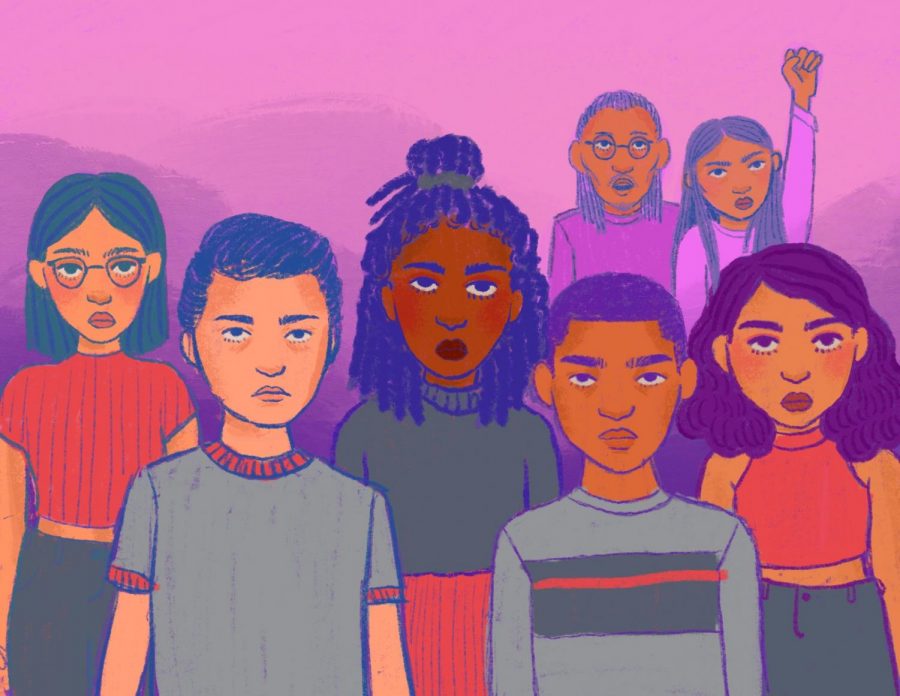Turning a blind eye to Indigenous history spurns more abuse
February 15, 2019
In the few days prior to Thanksgiving, my two preschool teachers gave my class the assignment of choosing to make a black-belted top hat, or a band decorated with colorful feathers. The purpose of this activity was to “choose to dress up as one of the groups that enjoyed the first Thanksgiving meal together.” My five-year-old self found nothing wrong with this, as I was grateful we did not have to work on spelling or numbers. Looking back, I realize that not only was this activity culturally offensive, but it was the idea of it being a fun and educational activity that was inappropriate. The truth behind the first Thanksgiving — that of a brutal genocide — was hidden from us children. The story of Indigenous people taught in many classrooms is very often brief and very often false. At least, this is the history that I grew up learning, causing me to not think much of Indigenous communities. Perpetuating this acceptance of their brushed-over history causes many people to ignore Indigenous people and their important background, just like I had, until recently.
I personally do not identify as an Indigenous person, and therefore I am not voicing their direct experiences and concerns. Not identifying as indigenous keeps me from fully understanding their current and historical struggles. In this piece, my intention is to share my understanding of how outsiders of Indigenous communities should be held accountable to understanding the history and present realities of Indigenous people in the United States.
It is crucial that we bring attention to the issue of Indigenous people being oppressed, historically and currently. As of the early 2000’s, Indigenous youth have the highest rate of sucicide among all ethic groups in the U.S., and the mortality rate caused by alcoholism in Indigenous people is 510 percent higher than other Americans, according to the National Congress of American Indians. These statistics directly correlate to the neglect of Indigenous existence, as our government does not supply adequate resources to Indigenous communities. From the brutal takeover of their land, to the recent video of an elderly Indigenous man being heckled by a crowd of white males, American society has continued to oppress Indigenous communities and neglecting their existence.
When white settlers came and took over this country, they started to form their own government that quickly took advantage of Indigenous lives. These governments subsidized boarding schools where Indigenous people were sent, stripped of their culture and white culture was forced onto them. They were required to dress a certain way and were banned from any of their religious practices at these schools. The extreme high rates of alcoholism in Indigenous communities is also due to the white government weaponizing alcohol to further control their lives. Assimilation of white culture did not stop historically. Today in countless classrooms, the history of Indigenous groups is lightly brushed over at most. The idea of not offering education about the people who originally inhabited this land is an outright message that says “your existence does not matter.” Schools instead tend to spend numerous units centered around the history of the white man and the colonizers, with one of these people being Christopher Columbus.
Many ETHS students are unaware of the significance behind attending a school in a district that does not acknowledge Columbus Day as a holiday. According to Cut, an online video storytelling platform, Indigenous people described Columbus Day as just another reminder of the brutal and grotesque events that took place. They also repeatedly mentioned one word they associate with Columbus: evil. The idea of people celebrating a man that caused so much pain for Indigenous ancestors is indicative of an appalling societal disregard for Indigenous struggles. Those who do not identify as Indigenous, and subsequently, may be unaware of issues faced by Indigenous people need to make conscious efforts to treat Indigenous communities respectfully. Perhaps by doing this, we will finally take one step closer to genuine understanding and inclusion.
Sure, because we don’t get a day off on Columbus Day, you’re now probably feeling a lot better about Evanston’s role in contributing to the treatment of Indigenous people. However, the problem that lies beneath is the ignorance pertaining to the values of their lives. John Evans, the founder of Evanston, was one of the causes of the Sand Creek Massacre, where approximately 150 Cheyenne and Arapaho tribe members were murdered. Following this massacre, Evans tried to rationalize the circumstances and remove the blame put on him. It is imperative that we absorb this information having to do with the founder of our city and learn from his decisions. This is not only a matter of addressing the history of Evanston, but rather finding the decency to acknowledge Indigenous people as individuals who exist and being more mindful of their true history within our own community.
It is important we realize that oppression faced by Indigenous communities has never ended. The challenges they face prevail, and it is on non-indigenous people, like myself, to recognize this and take action towards shifting the way they are treated by society. Incorporating Indigenous history into school curricula is an important step, which can cause more awareness in people who need to hear it. We should be given more information on the history of the areas we live in, and which Indigenous people or tribes once inhabited these areas. Perhaps this would lead people to rethink their decisions, and steer people away from contributing to an ignorant and disrespectful society. It all starts with appreciating and acknowledging Indigenous existence, especially because the ground you’re currently standing on is land that was stolen away from them.











poonam singh • Mar 17, 2019 at 2:44 am
Great topic for a new gen writer to take up!